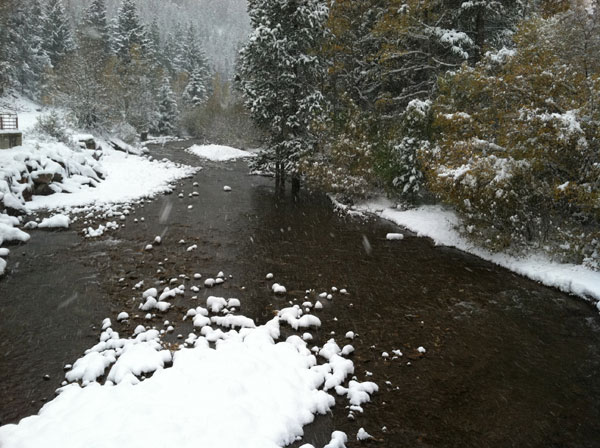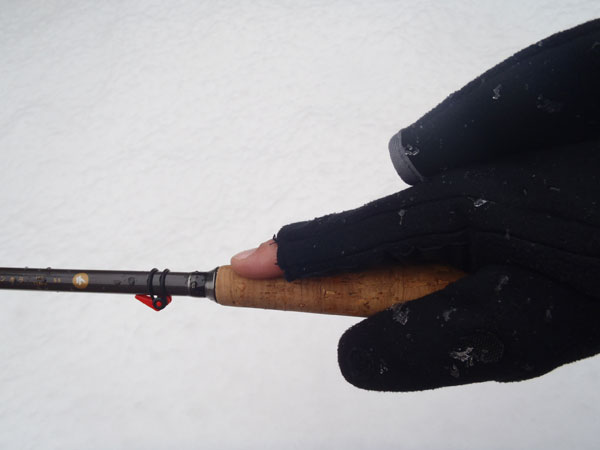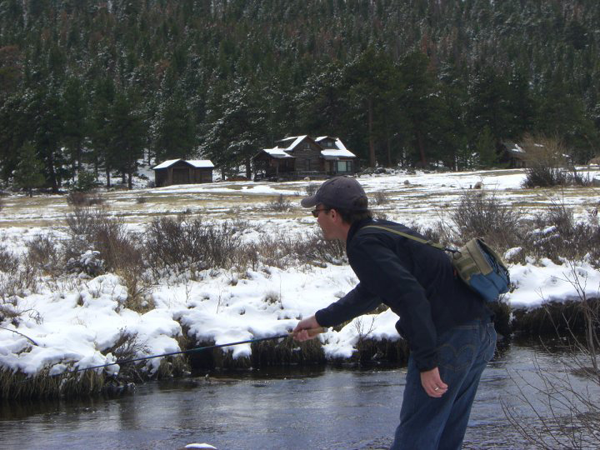Today was our first snow here in Parker, CO– a foreshadowing the long winter ahead. For many, winter means the end of trout season. Many will wait out the next few months tying flies or by turning to other winter sports until spring. But some will embrace the madness of winter fishing.
When I lived in Western New York, I did plenty of winter fishing for Salmon and Steelhead and, occasionally, some spring creek fishing. Fishing to me was a year-round sport. But I haven’t done much in the last few years. I plan to change that this year.
While winter fishing poses some unique challenges, it also has one huge advantage: crowd control. Even streams that are shoulder to shoulder in the summer can be totally empty in the winter, giving you all-day solitude. If you want a stream all to yourself, winter is the time to go.
Now that I fish tenkara exclusively, I have realized some of it’s advantages for winter fly fishing. It solves a few of the frustrations I had when using a western rod and reel. These realizations have prompted me to put on the long underwear, fleece pants, fingerless gloves, and take up winter fishing again.

Go ahead–it’s all yours!
Advantages of Tenkara for Winter Fishing
1. No guides to freeze up. Anyone who’s ever fished a western fly rod in winter knows the frustration of frozen guides. They can accumulate so much ice that the line can’t pass through, making it impossible to cast. And clearing the ice not only cuts into fishing time, but runs the risk of breaking a guide on your $600 fly rod. Since tenkara rods have no guides, this annoying ritual is completely eliminated.
2. No line to strip in. In winter fishing, cold hands can spell doom. Not only do you lose the dexterity to accomplish simple tasks like tying on a fly, but it can send you running back to the to warm up, losing even more fishing time. One of the worst culprits for cold hands in winter fly fishing is stripping in line. This makes your hands and/or gloves wet and wet = cold! Without any line to strip in, your hands can stay warm and dry in their gloves. And if you use a net and forceps, you’ll most likely never have to get them wet at all by avoiding touching the fish or the water.
3. Less line freeze. To be clear, if it’s cold enough, any line will freeze. But since tenkara allows you to keep more line off the water and do less false casting, your tenkara line will freeze less often than a traditional western plastic fly line. Line actually freezes in the air when you’re casting so the less line you get we to begin with and the less casting you do, the less your line will freeze. Like the frozen guides, the line de-icing ritual is not much fun either. Luckily, you’ll be doing less of it if you choose tenkara fishing.

Tenkara in winter = warm hands!
Fly fishing in the winter isn’t for everyone. You’ll probably catch less fish than you would in the spring or summer and did I mention that it’s damn cold? But for those who prize on-stream solitude and are up for a challenge, tenkara can take some of the headaches out of winter fishing.









You discribe winter fishing well. Sucking off ice from guides to make the next cast does take time for sure. This will be my first winter in Oregon using Tenkara. Solitude is my goal on each outing. There are places in the warmer months that I do not fish unless it is raining because most people stay home. I enjoy the winter fishing to the extreme. Last year I had to quit fishing in my float tube due to too much build up of snow on me and the belly boat. I use 5 mil waders with a bunch more insulation on the feet and fish in the tube until my toes tell me it’s time to quite. In Oregon the trout fishing on public rivers ends near the end of October. In the winter here salmon fishing & steelhead are targeted by many, so I tend to stick to lakes for my weekly fishing fix in the winter both IN the water and from shore. Plus, I belong the the Oregon Fish Club where we have access to lots of private river and still water properties and LOTS of big fish especially in the catch and release only locations. Most of all, and as you put so well, I have the waters all to myself.
Tight lines…….Delane
Nice comment Delane. Someone really needs to invent a heated float tube! Or waders. 😉
After reading this I will plan on some winter fishing. Thanks!
Another perk of winter fishing is that trout are typically stacked up in deep runs. The tenkara presentation is ideal for targeting the lethargic trout that aren’t willing to move far.
After looking at your photos of the snow, I realise that I shouldn’t be complaining about one day out of seven where it sleets or even once in a very rare while lightly sprinkle some snow, or about blustery wet winter days. Your winters make mine look like a balmy spring day, I’d forgotten how cold it gets in the north US. Feeling a bit wimpish right now looking at what you are fishing in! Wow. Now that’s a passion for fishing.
I haven’t really thought of the advantages of Tenkara for winter fishing until I read your post today. I just received my very first Tenkara rod yesterday, and the season started two days ago. Now I just need some available time with daylight before the rivers freeze up. Yippee!
Jason – looking for some Winter fishing with you, hopefully I can pick-up a thing or two. Winter fly fishing so far has been more or less a bust for me. Will you fish tenkara flies and techniques or will you switch to the dark side and nymph with weight and midges? Hopefully Waterton Canyon will open after New Year’s and we can bike up to the dam with our tenkara rods in the Ebira.
Hi Karel,
Yeah, can’t wait to get out with you either. I pretty much expect to be skunked a lot in winter so I don’t go with high expectations. I will probably try some sakasa kebari but don’t know if the fish would be willing to move to a fly (haven’t tried them in winter yet). I’m actually kind of betting on the Killer Bug. Seems like it would be a good fly for the lazy fish of winter.
Can’t wait to give it a try on my home waters,the Lackawanna River. Love steelhead fishing but,alas, its a two and a half hour drive to Pulaski. Winter fishing,Tenkara style,is going to be exciting!